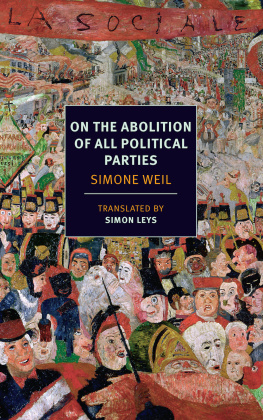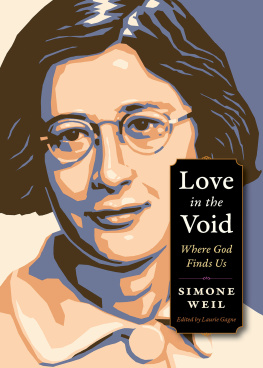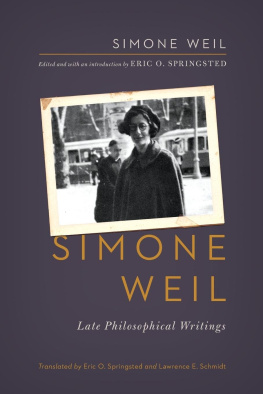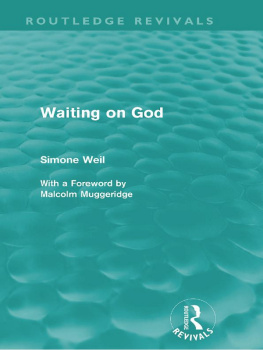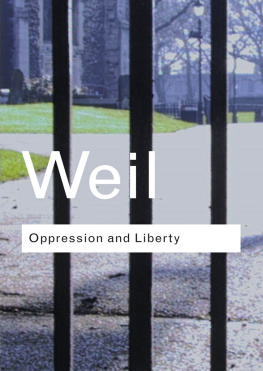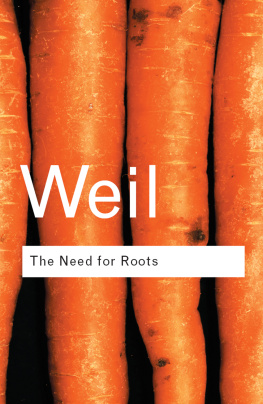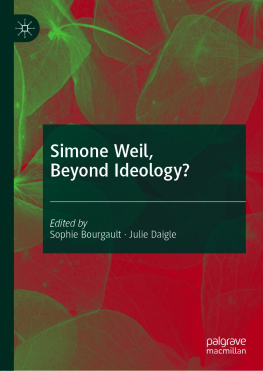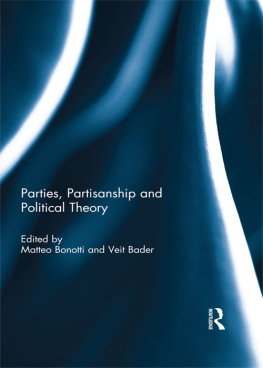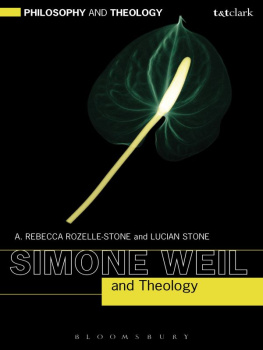ON THE ABOLITION OF ALL POLITICAL PARTIES
SIMONE WEIL
Translated from the French by
SIMON LEYS
And with an essay by
CZESLAW MILOSZ
NEW YORK REVIEW BOOKS

New York
THIS IS A NEW YORK REVIEW BOOK
PUBLISHED BY THE NEW YORK REVIEW OF BOOKS
435 Hudson Street, New York, NY 10014
www.nyrb.com
Translation copyright 2013 by Pierre Ryckmans
All rights reserved.
Note sur la suppression gnrale des partis politiques by Simone Weil, from crits de Londres et dernires lettres, copyright 1957 by Simone Weil, translated by permission of ditions Gallimard, Paris
The Importance of Simone Weil by Czeslaw Milosz copyright 2001 by Czeslaw Milosz, used by permission of The Wylie Agency LLC.
This edition originally published in Australia by Black Inc., an imprint of Schwartz Media Pty Ltd, Collingwood, Victoria
Cover image: James Ensor, Christs Entry into Brussels in 1889, 1888 (detail); J. Paul Getty Museum, Los Angeles; 2014 Artists Rights Society (ARS), New York / SABAM, Brussels; Giraudon / Bridgeman Images
Cover design: Katy Homans
A catalog record for this book is available from the Library of Congress
ISBN 978-1-59017-790-7
v1.0
For a complete list of books in the NYRB Classics series, visit www.nyrb.com or write to: Catalog Requests, NYRB, 435 Hudson Street, New York, NY 10014.
CONTENTS
TRANSLATORS FOREWORD
Once in a blue moon, on strictly non-political issues, dealing purely with questions of ethics, members of Parliament are allowed to make a conscience vote. A conscience vote what an extraordinary notion! It should be a pleonasm: dont we all assume that every vote by definition is being made by MPs who listen to their consciences, instead of following some diktat from a political party?
The first quality of a politician is integrity. Integrity requires independence of judgment. Independence of judgment rejects partisan edicts, for partisan edicts stifle in a mans conscience all sense of justice and the very taste of truth.
When such basic truths are ignored, Parliament turns into an unseemly circus, provoking dismay and contempt in the general public across all party lines. When voters distrust and despise their representatives, democracy itself is imperilled.
While I feel privileged to live in a Western democracy, now and then shocking aspects of partisan politics inspire me to read again Simone Weils comments on this particular evil. Though her essay was written nearly seventy years ago, in very different circumstances, it seems to me greatly relevant for us here today. I therefore undertook to translate it into English, in the hope that it might provide the starting point for a healthy debate.
Though I have no particular competence that would enable me to adjudicate dissenting views, there is one objection which, I think, should be refuted from the start: some may object that Weil is hopelessly utopian, unrealistic and impractical. Such an objection entirely misses the point, which was well illustrated by Chesterton in a famous parable:
Suppose that a great commotion arises in the street about something, let us say a lamp-post, which many influential persons desire to pull down. A grey-clad monk, who is the spirit of the Middle Ages, is approached upon the matter and begins to say, in the arid manner of the Schoolmen, Let us first of all consider, my brethren, the value of Light. If Light be in itself good At this point, he is somewhat excusably knocked down. All the people make a rush for the lamp-post, the lamp-post is down in ten minutes, and they go about congratulating each other on their unmediaeval practicality. But as things go on they do not work out so easily. Some people have pulled the lamp-post down because they wanted the electric light; some because they wanted old iron; some because they wanted darkness, because their deeds were evil. Some thought it not enough of a lamp-post, some too much; some acted because they wanted to smash municipal machinery; some because they wanted to smash anything. And there is war in the night, no man knowing whom he strikes. So, gradually and inevitably, today, tomorrow or the next day, there comes back the conviction that the monk was right after all, and that all depends on what is the philosophy of Light. Only what we might have discussed under the gas-lamp, we now must discuss in the dark.
Let us now discuss the philosophy of political parties under the light of Simone Weil: going back to first principles.
S.L.
Canberra, August 2012
. G. K. Chesterton, Heretics (1905), end of chapter I, Introductory Remarks on the Importance of Orthodoxy.
NOTE ON THE TEXT
Note sur la suppression gnrale des partis politiques was written in 1943, at the very end of Weils tragically short life. She was in London, where she had rallied the Free French around Gnral de Gaulle; she was deeply dismayed by various attempts of French politicians in exile to revive the old and destructive practices of party politics rivalries and factionalism. Finally, as a matter of principle, she resigned from all her duties with the Free French on 26 July. She was already in hospital, where she died shortly afterwards, on 24 August, aged thirty-four.
This essay was published for the first time seven years later, in the monthly journal La Table ronde (No. 26, February 1950). The publication was immediately hailed both by Andr Breton and by Alain (the pen-name of Emile Chartier, a former philosophy teacher of Simone Weil and himself a distinguished philosopher and writer). It was subsequently reissued in book form by Gallimard (1953), and more recently (2008) by Climats-Flammarion, in an edition that includes both Bretons and Alains earlier articles. It will also form part of the final volume of the monumental Oeuvres compltes de Simone Weil, edited by Florence de Lussy (Gallimard).
I have also included a short yet masterly essay by Czeslaw Milosz, written in 1960, presenting the life and thought of Simone Weil. I have added a note on Milosz himself and his discovery of Weil, thanks to his friendship with Camus.
ON THE ABOLITION OF ALL POLITICAL PARTIES
The word party is taken here in the meaning it has in Continental Europe. In Anglo-Saxon countries, this same word designates an altogether different reality, which has its roots in English tradition and is therefore not easily transposable elsewhere. The experience of a century and a half shows this clearly enough. In the Anglo-Saxon world, political parties have an element of game, of sport, which is only conceivable in an institution of aristocratic origin, whereas in institutions that were plebeian from the start, everything must always be serious.
At the time of the 1789 Revolution, the very notion of party did not enter into French political thinking except as an evil that ought to be prevented. There was, however, a Club des Jacobins; at first it merely provided an arena for free debate. Its subsequent transformation was by no means inevitable; it was only under the double pressure of war and the guillotine that it eventually turned into a totalitarian party.
Factional infighting during the Terror is best summed up by Tomskys memorable saying: One party in power and all the others in jail. Thus, in Continental Europe, totalitarianism was the original sin of all political parties.
Political parties were established in European public life partly as an inheritance from the Terror, and partly under the influence of British practice. The mere fact that they exist today is not in itself a sufficient reason for us to preserve them. The only legitimate reason for preserving anything is its goodness. The evils of political parties are all too evident; therefore, the problem that should be examined is this: do they contain enough good to compensate for their evils and make their preservation desirable?

